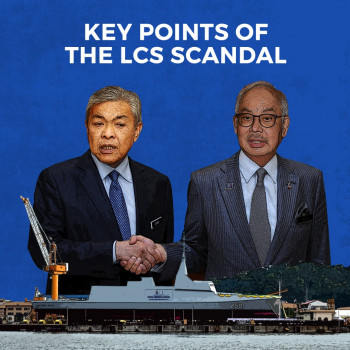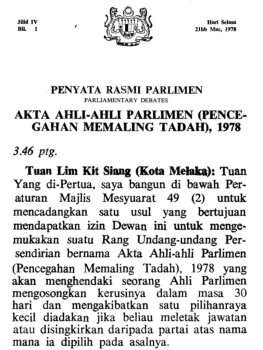 Elusive, mythical, wishful – call it what you will, but Zairil Khir Johari firmly believes that there is such a thing as Bangsa Malaysia.
Elusive, mythical, wishful – call it what you will, but Zairil Khir Johari firmly believes that there is such a thing as Bangsa Malaysia.
Clarifying that it is not a race in the literal sense, he acknowledges that the concept cannot be traced anthropologically. He prefers to describe it as “a cultural identity”, referring to a shared sense of belonging towards the Malaysian nation and all its idiosyncrasies.
“Why do I need to be identified by my ancestors’ race? I’m Malaysian,” says Zairil, the political secretary to DAP secretary general Lim Guan Eng.
While he is often mistaken for a Chinese due to his facial features, Zairil is comfortable asserting his Malaysian identity as more dominant, notwithstanding his mixed-parentage.
“I am Malay. I am also Chinese. But I’m a Malaysian first,” he asserts.
The 29-year-old believes that identifying himself as “Malaysian first” does not make him any less Malay.
“By identifying yourself as a Malaysian first, you don’t lose your roots as a Malay at all,” said Zairil, adding that he is baffled why Malaysians still cannot look past race today.
“Hey, Asian kid!”
Narrating a childhood experience from when he was briefly staying in the United States, he remembers an older boy coming up to him and calling him “hey, Asian kid”. As a six-year-old, Zairil says the only identity he understood then was ‘Malaysian’.
Not being aware of racial concepts at that tender age, he had no clue that the older boy had been referring to his ethnicity. So he replied, “No, I’m Malaysian. Asia isn’t even a country.”
Reflecting on the significance of that incident, Zairil marvels at the innocence of his younger self. “I pretty much grew up understanding that I lived in Malaysia and I was Malaysian. ‘Malay’ and ‘Chinese’ were cultural concepts to me, and collectively formed my Malaysian identity.”
On racial stereotypes
The chocolateur-turned-politician recently lodged a police report about a YouTube video clip entitled “Sembang Rakyat – Kedai 1 Malaysia” which he claims is seditious and defamatory. Zairil describes the eight-minute clip as “maliciously crafted around racial stereotypes.”
The video depicts a multiracial group accusing the DAP of masterminding the country’s inflation crisis by asking its mainly-Chinese supporters to raise prices “so that the people will hate the government”.
Zairil dismisses the conspiracy theory as “a desperate attempt to fool the public”.
Criticising the video’s premise that “all Chinese are businessmen, so prices must be controlled by them,” Zairil says that confusing stereotypes with reality is wrong on every count.
In fact, goods like fuel, sugar and rice are government-controlled monopolies, he explains. Besides being price-regulated under legislation, most essential items are controlled by GLCs. He also points out that sugar is no longer controlled by Chinese businessman Tan Sri Robert Kuok but by tycoon Tan Sri Syed Moktar al-Bukhary.
In essence, Zairil says, we have to stop thinking that everything in the country has to do with race.
Racism, legacy of colonialism
Malaysian’s tendency to racialise society is a deep-seated reflection of our politics, says the father of one.
Our community is made up of political structures created for us by first our colonial masters and subsequently our own government. That’s why racism is so entrenched, says Zairil, alluding to BN-championed policies that have perpetuated an increasingly race-based system of divide-and-rule.
“Fortunately, this legacy is not irreversible. We must first rid our political system of race-based structures and this will be the first step (towards unity),” adds Zairil.
He lauds DAP for being “a non-racial party”. The Penang-born Zairil believes that DAP can appeal to all Malaysians because its policies are colour-blind and needs-based. As such, any Malaysian who believes in the same principles will feel that the DAP can best represent them. -The Rocket



